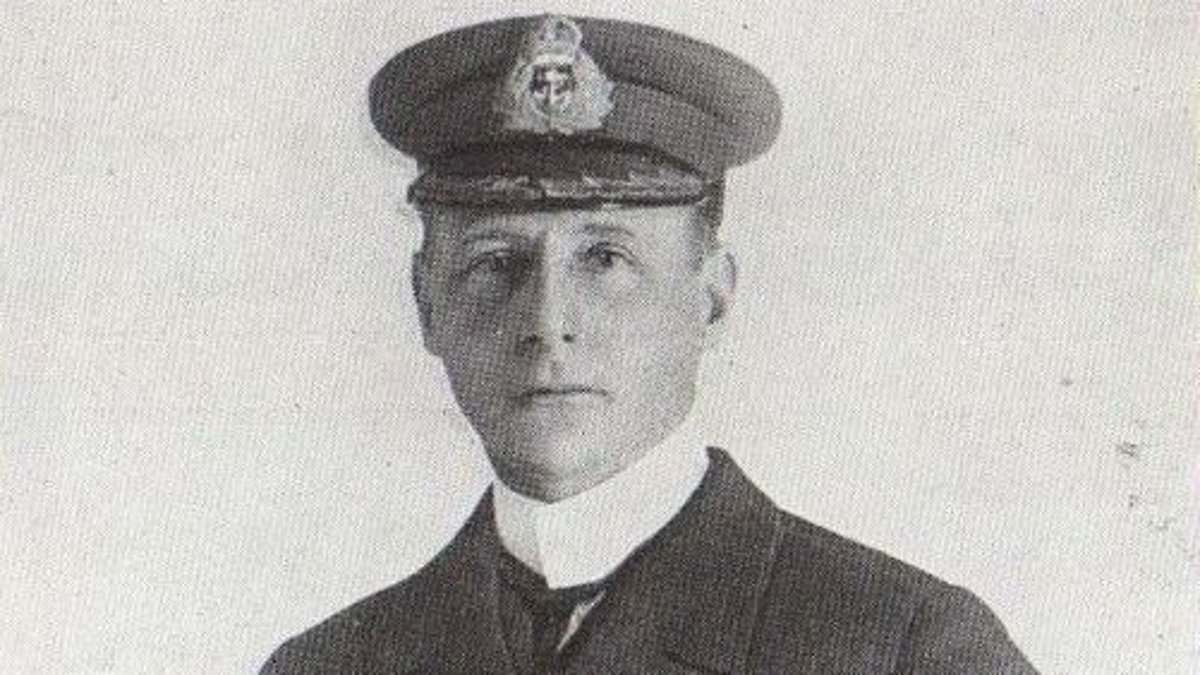His heroics in the face of enemy fire saw Captain Henry Peel Ritchie become the first Royal Navy recipient of the Victoria Cross.
Now the Scots seaman’s VC for his ‘gallant command’ of the battleship HMS Goliath during the Great War has fetched £240,000 at auction.
Ritchie, from Edinburgh, was wounded eight times in 20 minutes after his vessel came under a ‘storm’ of shells and bullets at Dar-es-Salaam in East Africa on November 28, 1914.
He maintained command until he fell unconscious due to loss of blood.
The medal was presented to Ritchie by King George V at Buckingham Palace.
It went under the hammer alongside Ritchie’s five other medals at Noonans of Mayfair, where it was bought by a commission bidder after a bidding battle with a rival in the auction room.
Ritchie was born at Melville Gardens, Edinburgh, on January 29, 1876, and attended George Watson’s College before joining the Navy as cadet in 1890 aged just 14.
Rising through the ranks, he won the Army and Navy lightweight boxing championship in 1900, and was also commended by Their Lordships of the Admiralty for attempting to save the life of a rating from drowning at Chatham in 1903.
After the outbreak of war in 1914, he was ordered to East Africa to help locate and destroy the German commerce raider Königsberg.
As second-in-command of the battleship HMS Goliath, Ritchie went to Dar-es-Salaam, where a number of German ships had been supplying Königsberg after the raider became trapped.
Ritchie took command of Goliath’s steam pinnace to enter the harbour, where the vessel came under heavy fire from huts by the water’s edge, from houses, wooded groves and hills above, and even from a cemetery.
Ritchie was hit on the forehead, in the left hand, twice in the left arm, in his right arm and hip; and finally, two bullets through his right leg, before he fainted.
But his efforts helped bring the pinnace back alongside Goliath, which opened fire with its main 12-inch guns.
Ritchie received his VC on April 24, 1915, and, the following month, returned to light duties with an appointment at the Haslar Gunboat Yards in Hampshire.
His citation, in the London Gazette of April 10, 1915, read: ‘For most conspicuous bravery on the 28th November 1914 when in command of the searching and demolition operations at Dar-es-Salaam, East Africa.
‘Though severely wounded several times, his fortitude and resolution enabled him to continue to do his duty, inspiring all by his example, until, at his eighth wound, he became unconscious.
‘The interval between his first and last severe wound was between twenty and twenty-five minutes.’
Ritchie was later appointed to the command of the armed boarding steamer Suva, employed in the Red Sea, supporting military operations including those by Lawrence of Arabia.
Ritchie, who was promoted Captain on the Retired List in January 1924, lived at Craig Royston House in Edinburgh, where he died on 9 December 1958, aged 83.
The VC, which remained in ‘extremely fine’ condition, was sold alongside Ritchie’s 1914-15 Star, British War and Victory Medals, Coronation 1937 medal and Coronation 1953 medal.
Nimrod Dix, Deputy Chairman of Noonans and Director of the Medal Department, said: ‘When the pinnace came under a withering fire, 38-year-old Ritchie took over the wheel from his wounded coxswain and steered for the harbour’s entrance.
‘But it took 20 minutes to get clear, in which period he was wounded eight times – on the forehead, in the left hand, twice in the left arm, in his right arm and hip and, finally, by two bullets through his right leg.’
Capt. Ritchie’s V.C was among the highlights of a ‘phenomenal collection’ of naval medals put together by the late Jason Pilalas.
Pilalas, of Connecticut, USA, served as an officer in the US Navy, with whom he completed three tours of Vietnam.
Mr Dix added: ‘He was not only a man of many talents, but he was also a man of many interests, none more so than his relentless pursuit of knowledge of all things relating to the Royal Navy.
‘This voracious appetite for knowledge being matched only by his seemingly unquenchable thirst to collect objects relating to his passion. However, as much as Jason cherished his collection, he was always mindful of the fact that he was just the custodian of these objects in his own lifetime.’
■ Click here to visit the Scotland home page for the latest news and sport
